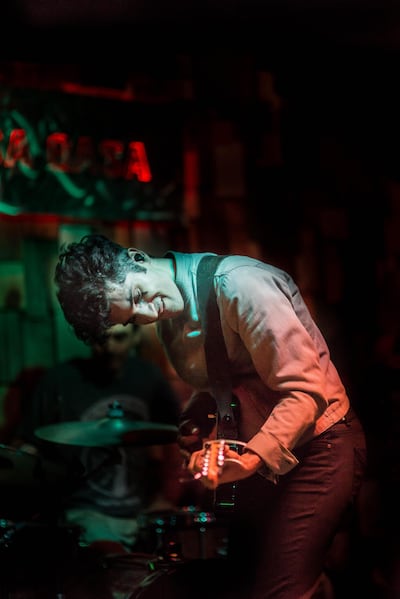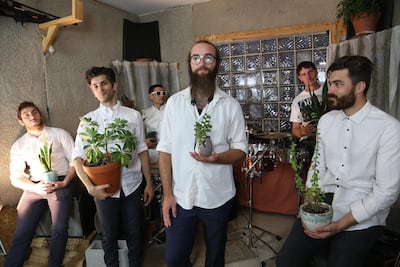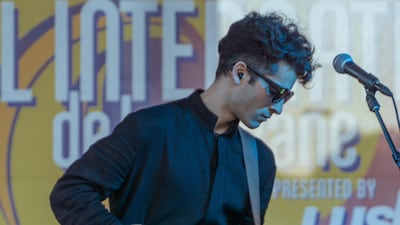The First Gulf War. Early 1990s grunge. Khaleeji theatre and music. Several heavy doses of Americana. It is no surprise the artist who goes by +Aziz (Plus Aziz) sounds like few other musicians.
Tomorrow, Chapter 2, the latest EP by his band Kuwaisiana – a portmanteau of his native Kuwait and current home of Louisiana – will be released online. For the child who grew up in Kuwait's Mishref, and who now chooses to go only by his stage name, it's been a unique, sometimes unusual, musical education.
"My sister had a friend who bought all these teen magazines," +Aziz, 38, tells The National. "I remember flipping through them and eventually my curiosity moved from boy bands to rock figures like Kurt Cobain and Damon Albarn. Her brother was closer to my age and he was the first person I met who played guitar. Their dad was also a huge Beatles fan, so I was exposed to rock music through this amazing family."
The war led to his family moving to the US in 1992, and there an obsession with music would lead to days spent making mixtapes and an impressive music video collection on VHS. His first steps as a musician, however, were not exactly rock and roll. "The first instrument I picked up was the flute," he says. "I was in third grade, I was in a class with four girls. One day they made a comment about how the flute is for girls, and it was enough to make me switch to piano. So I played piano for a long time before switching to guitar at 16."
By the time the family moved back to Kuwait in 1995, +Aziz was fascinated by the idea of fusing the different musical genres he'd been exposed to.
"I began daydreaming about what 'Khaleeji rock' would look and sound like some time around ninth and 10th grade," he recalls. "I had already discovered rock music and how Japanese rock musicians were embracing western music to break their own social codes. I had a relatively clear goal in my mind to pursue making bilingual rock music by the late 1990s."
He had long observed that many young Kuwaitis and Arabs were increasingly shunning their own language and embracing English, something he wanted to avoid. “Throughout high school, I would daydream about hearing the Sex Pistols in my dialect or a band like Tool with Khaleeji rhythms and handclapping,” he says. “People have always told me I don’t look, sound or behave like a Kuwaiti, but I still thought, this is who I am and I want to claim it.”

+Aziz would return to live in the US twice. First, as a college student in 2002, and then permanently in 2009. It was after moving from New York City to New Orleans in 2014 that the idea to start a band came together. Louisiana, with its significantly slower pace than New York, not to mention easier logistics, proved an ideal place to do that.
With a passion to combine the musical heritage of his old and new homes, +Aziz started Kuwaisiana. Drummer Matthieu L'etudiant and hand-percussionist Pat Driscoll joined in 2016 after responding to a post on Craigslist. Nick Ferreirae (sax), Dehan Elcin (trumpet) and Same Levine (bass) came in later through word of mouth.
"By playing with Matthieu, I opened myself up to ska, reggae and other types of unique rhythms," +Aziz says. "So many of the influences you hear in there are actually his or from another bandmate."

The group's first EP, Chapter 1, was released by Universal Music Mena in 2018, and, before the pandemic, they were playing one or two local shows a month. The video for their recent catchy single Bara7a showcases +Aziz's disparate influences, both visually and sonically.
"The Smashing Pumpkins, in particular, encouraged me to be myself because the lead singer [Billy Corgan] has such a weird singing voice, but it worked so well with those early records," he says. "There would be other bands like Nine Inch Nails, The Mars Volta, Sigur Ros, Deftones and Incubus, that would capture my imagination and help me cope with where I was in life."
Closer to his homeland, +Aziz says he was initially influenced by Kuwaiti theatre and comedy more than Khaleeji music. "It really wasn't until I had been living in the US and started connecting with brilliant minds like Ghazi Al Mulaifi or Hasan Hujairi that I started to develop some understanding of the intricacies of Khaleeji music," he says.
Those influences can be heard in Chapter 1. The 22-minute Chapter 2, to be self-released on Bandcamp and all streaming platforms, explores the day-to-day experiences and frustrations of Arab-American youth and those living in the Arabian Peninsula, with +Aziz tackling topics such as bullying and xenophobia.
"Compared to Chapter 1, there is less genre-hopping," he says. "But you'll find that Bara7a and 3arees are more tongue in cheek, while Guwwa, Orange Klan and Cymbal of this City are more serious and perhaps even challenging."
Heavily driven by guitar rock, +Aziz also mixes elements of jazz, funk and Afrobeat in what he calls his “outsider music”. He concedes it can feel alien to both Arabs and Americans.
“I didn’t grow up in America, so I’m not exactly an Arab-American, and I also haven’t lived in Kuwait for over a decade, so I don’t represent locals, either,” he says. “I can only hope that listeners see me as someone who is adding value rather than a force of cultural gentrification and erosion.”
American audiences have so far received his music very generously. "The dirty secret about rock music is that lyrics are the last thing people will listen for in a song, so you can really get away with a lot," he says.
For their part, Middle Eastern audiences have veered from the supportive to the occasionally abusive. "There is resistance to mixing English and Arabic lyrics," he says. "The Japanese are so much more eccentric in the way they've embraced rock, but Middle Eastern audiences want musicians who have a great command of the dialect used and have a solid appreciation for metre, rhyme scheme.
“I generally keep my Arabic and English lyrics apart, but people get really fired up when I put things in the blender.”
With the coronavirus seemingly not going away any time soon and the future of live music up in the air, +Aziz says Kuwaisiana will be working on five new songs for Chapter 3, and will continue releasing tracks as singles.
"Honestly, touring and playing shows is so stressful that being home just opened time for me to focus on improving my knowledge of maqam and delve into the details of Khaleeji rhythm and music," he says.
“I’ve had time to grow my Patreon [creative membership account], organise my songs and songwriting themes, and begin to develop a home studio. I’m almost 40 and I just think I have to have all these things in place to give my music a fighting chance.”

